Let's talk about the fascinating mix of luck and skill in gambling. You know how some people swear they've got a "system" while others just cross their fingers and hope for the best? Well, the truth lies somewhere in between.
Think of slot machines and roulette – they're pretty much like flipping a coin. No matter how many lucky charms you're carrying, these games are pure chance. But then you've got games like poker and blackjack, where your decisions actually matter. It's kind of like the difference between guessing what weather we'll have next month versus checking tomorrow's forecast – one's just random, while the other lets you use some real knowledge.
Professional gamblers aren't just rolling the dice and praying, though. They're more like chess players who've done their homework. They know the odds inside and out, can read their opponents like a book, and handle their bankroll with the precision of a careful investor. But here's the thing – even the best players can't completely escape Lady Luck's influence.
So what's the real deal? Can skill really beat chance at its own game? Well, it depends. In games where you make choices, being skilled definitely tips the odds in your favor. But gambling is still gambling, and there's always that element of uncertainty lurking around the corner. It's kind of like being a great surfer – you can master the techniques, but you're still at the mercy of the waves.
Just remember, while skill can help you make smarter choices, there's no such thing as a sure bet. Anyone who tells you differently is probably trying to sell you something.
Understanding Pure Chance Games
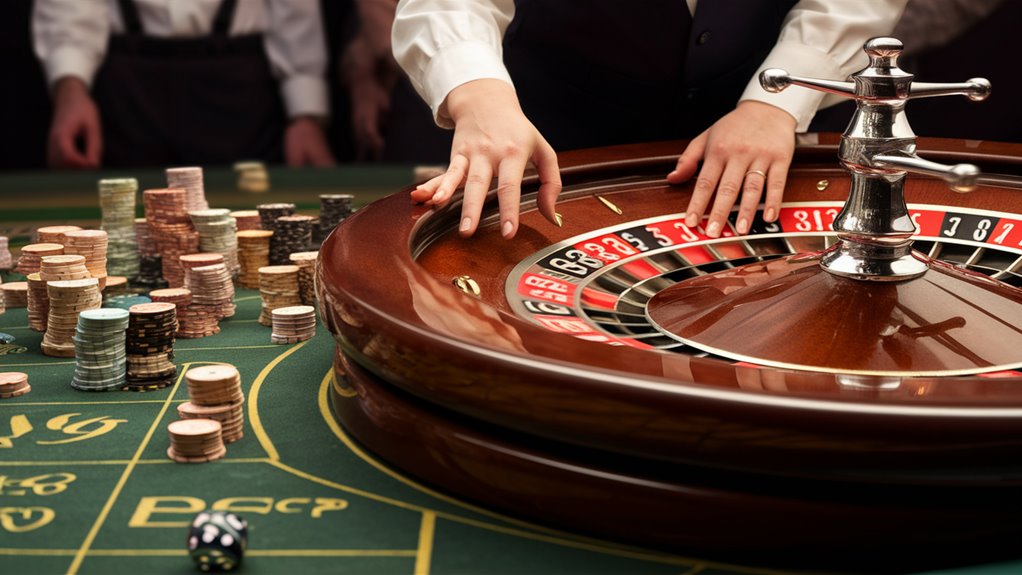
Let's talk about games of pure chance, the kind where luck calls all the shots. You know those moments at the slot machine, roulette table, or when you're holding a lottery ticket?
Well, here's the thing – no matter what you do, the odds stay exactly the same for every single play.
Think about it like this: when you flip a coin, your previous tosses have absolutely no bearing on whether it'll land heads or tails next time. The same principle applies to these games.
Whether you're feeding coins into a slot machine or watching that little white ball bounce around the roulette wheel, each moment is brand new, with its own fresh set of odds.
Most of these games run on sophisticated random number generators (RNGs) or good old-fashioned physics. Take slots, for instance – the outcome is locked in the moment you hit that button, even before those reels stop spinning.
Or consider roulette, where it's all about gravity and momentum deciding where that ball ends up.
Now, you might be thinking, "But I've got a system!" or "I'm due for a win after all these losses!"
Truth is, these games don't have a memory. They don't care if you've lost ten times in a row or just hit the jackpot. Each spin, roll, or draw starts fresh, with the same odds as always.
It's a bit like Mother Nature – she doesn't keep score or play favorites.
Understanding this helps you see why those betting systems and pattern-tracking strategies you hear about can't beat the house edge. Sure, they might seem logical, but in pure chance games, math always has the final say.
Kind of puts things in perspective, doesn't it?
Strategy Games in Gambling
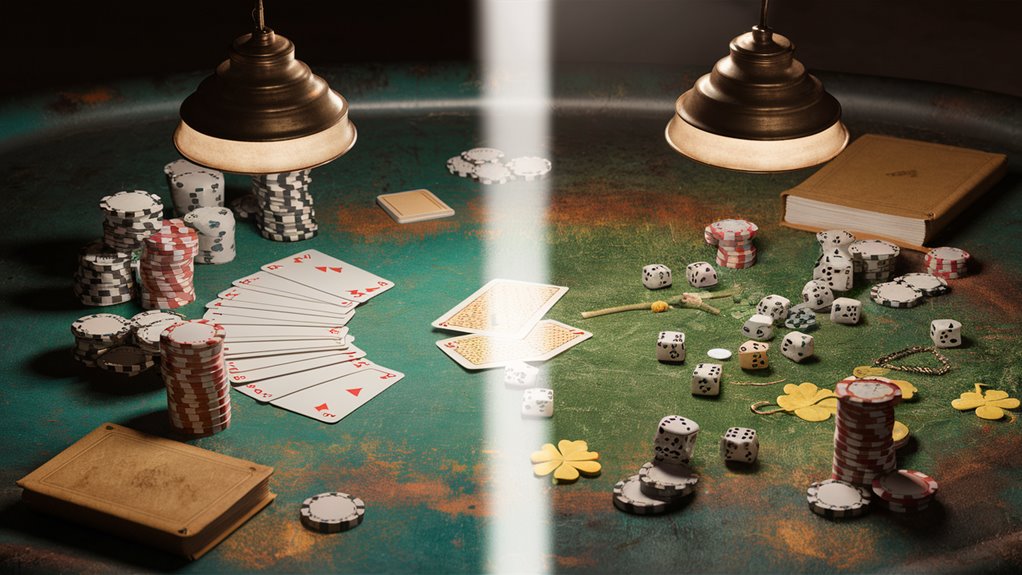
You know what's fascinating about gambling? Not all games are just about crossing your fingers and hoping for the best. Let's talk about strategy games like poker, blackjack, and sports betting – these are different beasts altogether.
When you sit down at a poker table or open up your sports betting app, you're actually stepping into a world where your choices really matter.
Think of it like chess with stakes. In poker, for instance, you're not just playing your cards – you're playing the people across the table.
Ever noticed how some players seem to always know when someone's bluffing? That's because they've mastered the art of reading tells and understanding human behavior. Plus, they've done their homework on probability and position play.
Blackjack's another great example. Sure, the casual player might just hit or stand based on gut feeling, but smart players? They've studied basic strategy inside and out.
Some even take it further by learning card counting – though casinos aren't exactly fans of that approach!
Sports betting takes things in a different direction. It's like being a detective, really. You'll find yourself diving into team statistics, checking injury reports, and even keeping an eye on the weather forecast.
Some of the best sports bettors I know spend hours analyzing data before placing a single bet.
But here's the thing – none of these games are get-rich-quick schemes. They require patience, discipline, and yes, a bit of emotional control.
You need to know when to press forward and when to step back. While luck might determine whether you win or lose tonight, it's your skill level that'll show up in the long run. Pretty cool how that works, right?
Math Behind Gambling Odds
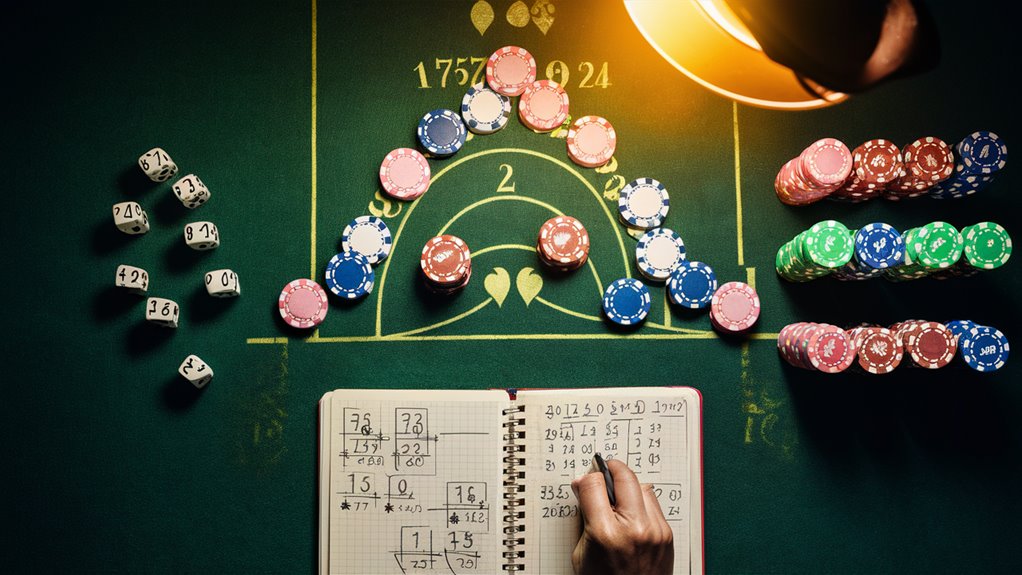
Let's break down the fascinating world of gambling odds, because, honestly, it all boils down to the numbers. You know how casinos always seem to come out on top? Well, there's a reason for that – every game has what we call a house edge, which is basically your mathematical disadvantage as a player.
Think of it this way: different games give you different chances of winning. Take baccarat, for instance, where you're only at a tiny 1.06% disadvantage. But then you've got games like keno, where, yikes, you could be looking at the house having a whopping 25% advantage over you.
Want to really understand your chances? It helps to wrap your head around probability theory.
Let's look at blackjack as an example. If you're playing with perfect basic strategy (which, let's be real, takes some serious practice), you're only facing a 0.5% house edge. In plain English? You'll probably lose about 50 cents for every hundred bucks you bet. Not too shabby, right?
Now, roulette's a different story. Picture betting on a single number on a European wheel. Your chances? Just about 2.7%.
But here's the exciting part – if you hit it, you're looking at a sweet 35-to-1 payout.
Here's the thing about gambling that most people don't realize: the more you play, the more likely your results will match what math predicts.
It's called the law of large numbers, and it's why casinos never sweat the small stuff. Sure, they might lose big on any given night, but they know time is on their side. Those odds we talked about? They're pretty much set in stone over the long haul.
Understanding these numbers won't help you beat the system, but it'll definitely help you make smarter choices about which games give you the best shot at walking away a winner.
Psychological Elements of Betting
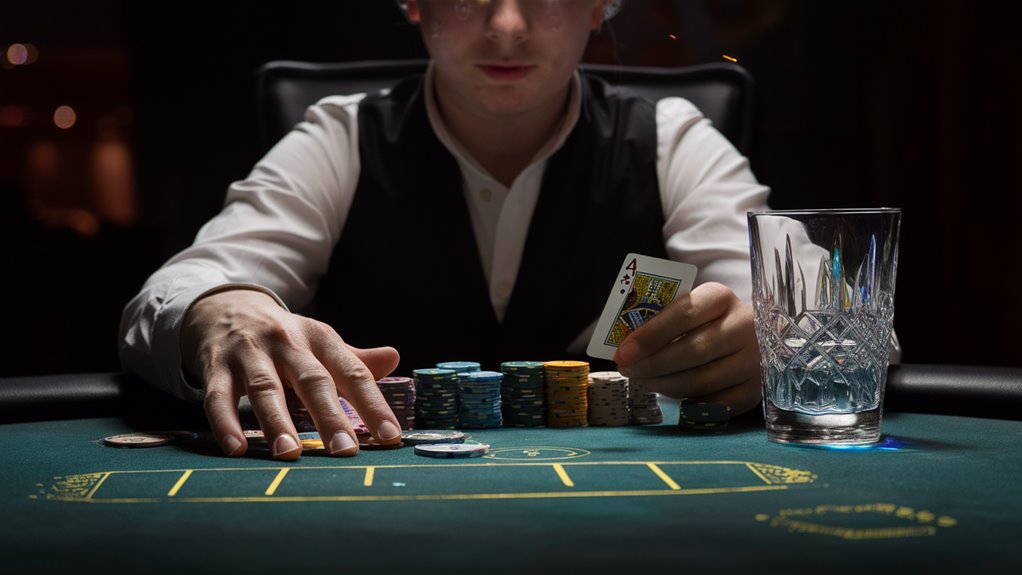
Let's talk about what really goes on in your mind when you're placing a bet. You know, it's not just about knowing the odds or understanding statistics – there's a whole lot more happening behind the scenes in your brain.
Think about the last time you placed a bet. Your heart probably started racing a bit, right? That's because betting taps into some pretty complex stuff in your mind.
We're talking about emotions, gut feelings, and all those little mental shortcuts our brains love to take.
Here's something interesting – your brain actually plays a few tricks on you when you're betting. Remember that time you won and felt absolutely amazing? That's your brain's reward system doing its thing, releasing feel-good chemicals that make you want to experience that rush again.
But here's the catch – you probably remember your wins way more clearly than your losses. It's like our brains have a highlight reel that conveniently edits out the not-so-great moments.
When you're stressed or worried about money, things can get even trickier. You might find yourself making snap decisions or trying to win back what you've lost.
It's kind of like grocery shopping when you're hungry – not the best idea, right?
But hey, there's good news. Once you understand these mental patterns, you can actually work with them instead of against them.
Try setting clear limits before you start, like deciding how much you're willing to spend before emotions kick in. Think of it as creating a game plan for your brain.
Keep track of both wins and losses (yes, even the ones you'd rather forget), and take a step back when you notice your emotions starting to run the show.
Professional Gambling Success Stories
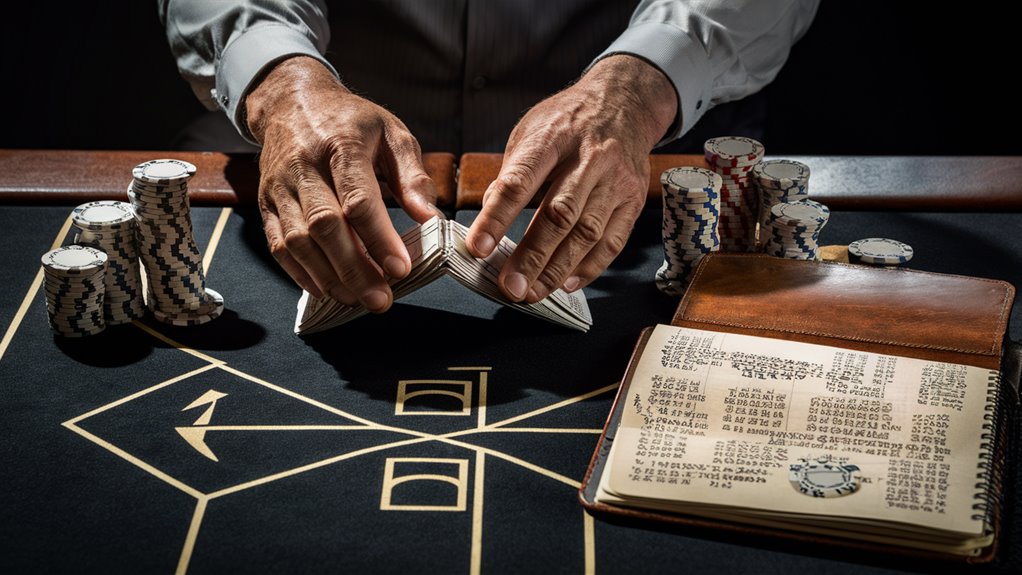
Ever wonder what makes professional gamblers so successful? Well, it's not just about getting lucky at the tables. Let's look at some fascinating stories of people who've turned gambling into a legitimate career.
Take poker legends like Phil Ivey and Daniel Negreanu, for instance. These guys aren't just throwing cards around hoping for the best.
They've actually cracked the code by blending serious math skills with an almost supernatural ability to read their opponents. Pretty impressive how they've turned that combination into million-dollar careers, right?
The sports betting world has its own share of brilliant minds. People like Billy Walters and Haralabos Voulgaris aren't your typical sports fans making random bets.
They're more like data scientists, really. They've built incredibly detailed statistical models and developed networks of information that help them spot opportunities others miss. And you know what? They've been winning consistently for decades.
Then there's the blackjack scene, where players like Don Johnson have taken things to another level. Instead of just sitting down and playing, they've studied everything from how casinos operate to specific dealer habits.
They've even negotiated special rules with casinos to get better odds. Talk about playing smart!
You might notice
Risk Management in Gaming
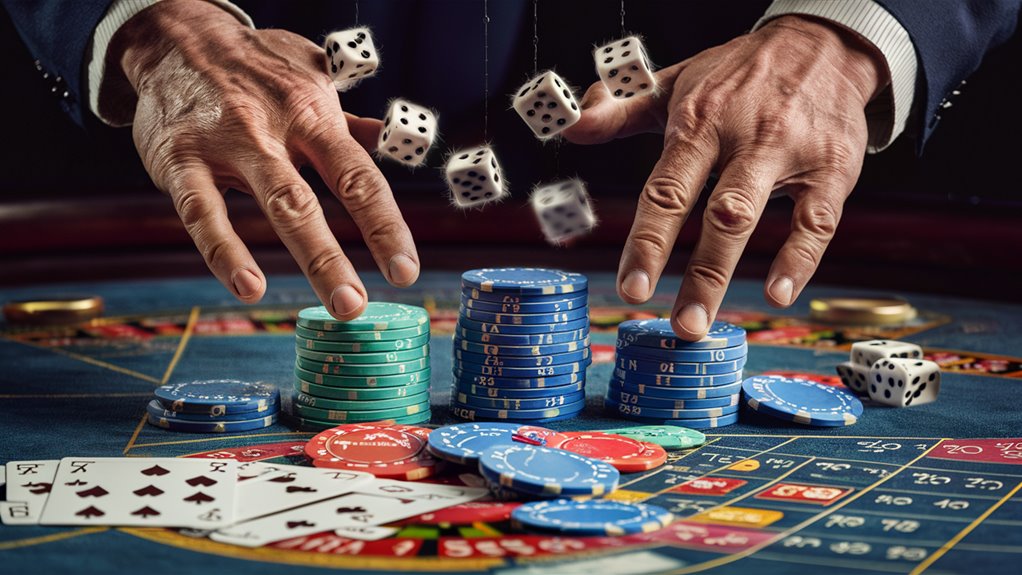
Let's talk about something that many gamers overlook – risk management. You know how it goes: you're having a great session, feeling lucky, and suddenly things take a turn. That's exactly why managing your risk is just as important as knowing your game strategy.
Think of your gambling bankroll like a business budget. You wouldn't spend your entire business savings on one venture, right?
The same goes for gaming. Set yourself some firm limits – both for each session and for the day. And here's the tricky part: you've got to stick to these limits whether you're winning big or facing a losing streak.
Smart players know it's better to spread their bets around, kind of like how you wouldn't put all your savings into a single stock.
Try mixing up your games and betting approaches. Maybe some poker here, some blackjack there – you get the idea. This way, if one game isn't treating you well, you're not completely out of luck.
Now, let me break down two crucial concepts: expected value (EV) and variance. Sure, these sound like fancy math terms, but they're pretty straightforward.
EV tells you if a game is worth playing in the long run, while variance is basically how wild the ups and downs might be. You'll want enough cash in your bankroll to ride out those rough patches without going bust.
One last thing – keep tabs on your gaming journey. Jot down your wins, losses, and what strategies worked best. It's like having a road map of your gambling experience.
After a while, you'll start spotting patterns that can help you fine-tune your approach. Trust me, this simple habit can make a huge difference in your long-term success.
Common Questions
How Do Cultural Differences Affect Gambling Strategies Across Different Countries?
You know, it's fascinating how different cultures approach gambling in their own unique ways. Take Asian gambling culture, for instance – games like baccarat and mahjong aren't just random choices. They're deeply woven into social traditions, often emphasizing luck and collective experience around the table. Over in Western countries, you'll find people gravitating toward poker and sports betting, where there's this real focus on individual skill and strategic thinking.
Let's break it down a bit. In many Asian communities, gambling is actually seen as a way to test your luck or even your destiny. That's why games of chance tend to be super popular there. Meanwhile, Western players often get drawn to games where they can show off their analytical skills and compete directly against others.
Think of it like this – if you've ever been to a casino in Macau, you'll notice the intense energy around baccarat tables, with players following intricate rituals they believe will bring good fortune. Pop into a Las Vegas poker room, though, and you'll find players carefully calculating odds and reading their opponents' behavior. Same activity, totally different approaches.
These preferences really tell us something about how each culture views success and entertainment. While Asian gamblers might see a lucky streak as a sign of good fortune smiling upon them, Western players often pride themselves on mastering the mathematics and psychology behind their chosen games.
Can Certain Medications or Health Conditions Impact Gambling Decision-Making Abilities?
Let's talk about how certain medications and health conditions can affect your gambling choices. You know how some days you feel sharper and more in control than others? Well, there's actually a scientific reason behind that, especially when it comes to gambling decisions.
Think of your brain like a car's control system. When you take medications that affect impulse control or cognitive function, it's similar to having a slight delay in your brake response. This can make it trickier to know when to stop or slow down while gambling.
Some common health conditions can really shake things up too. If you have ADHD, for instance, you might find it harder to stick to your gambling budget or walk away from a game. People with bipolar disorder often experience periods where their judgment about risk-taking might not be as reliable as usual. And here's something interesting – individuals with Parkinson's disease sometimes notice changes in their gambling habits, particularly if they're taking certain medications to manage their symptoms.
The thing is, many people don't realize their medications might be influencing their gambling choices. It's kind of like wearing tinted glasses – you might not notice how they're changing your perception until someone points it out. So if you're taking any medications or managing a health condition, it's worth having a chat with your doctor about how this could affect your gambling decisions.
What Role Does Weather Play in Outdoor Gambling Events?
Let's talk about how Mother Nature can really shake things up at outdoor gambling events. You know how unpredictable weather can be, right? Well, imagine trying to shuffle cards when a sudden gust of wind decides to turn your poker hand into a flying circus!
Weather plays a huge role in these events, and it's not just about getting a little wet. Think about trying to roll dice on a table that's being pelted by rain, or keeping your cool during a high-stakes game when the sun is beating down mercilessly. Even the most experienced dealer might struggle to maintain perfect control in these conditions.
Temperature can be a real game-changer too. When it's too hot, players get uncomfortable and lose focus, making decisions they might regret later. Cold weather? Your hands might get stiff, making it tricky to handle chips or cards smoothly. And let's not forget about humidity – it can make cards stick together like they've been glued!
These weather challenges don't just affect the games themselves. They can make or break attendance numbers too. After all, who wants to sit through a poker tournament when it feels like they're in a sauna? This is why many organizers now keep a close eye on weather forecasts and often have backup plans, like temporary shelters or indoor alternatives.
How Does Sleep Deprivation Affect Gambling Performance and Risk Assessment?
Let's talk about how lack of sleep messes with your gambling decisions. You know that foggy feeling when you're running on empty? Well, it turns out it's particularly dangerous at the casino or
Do Left-Handed Players Have Any Advantages in Specific Casino Games?
You know, being left-handed in a casino isn't quite the game-changer some might think, but there are some interesting quirks worth talking about. Let's break it down a bit.
In most casino games, your dominant hand doesn't really make much difference. Slot machines, blackjack, and roulette are pretty much designed to work for everyone. But here's where it gets interesting – some lefties find they have a subtle edge in certain situations.
Take poker, for instance. If you're sitting at a table full of right-handed players, being a southpaw might give you a bit more elbow room when you're dealing cards or managing your chips. Plus, your betting movements might come across as slightly less predictable to opponents who are used to watching right-handed players.
When it comes to shooting dice, some left-handed players swear they have better control from certain positions at the craps table. It's not exactly a superpower, but hey, in gambling, even tiny advantages can feel significant.
Bottom line? While being left-handed won't dramatically boost your odds of winning, it might offer some small comfort advantages in specific games. Just remember, smart strategy and good bankroll management matter way more than which hand you use to place your bets.
